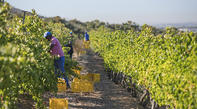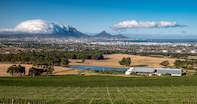De Grendel’s main vineyards are situated on the slopes of the Tygerberg mountain, surrounded by the Cape’s indigenous fynbos biome. Sauvignon Blanc and Merlot grapes grow in a combination of blue shale, glen rosa and oak leaf soil, and are harvested when they reach perfect ripeness.
The Graaffs also farm near the town of Ceres on the slopes of the Witzenberg mountains, where the cold climate is perfect for Pinot Noir and Chardonnay.
De Grendel Wine Estate is passionate about maintaining the harmonious relationship between conservation and farming. Situated alongside indigenous vegetation, the estate is a proud protector of the natural biome in which they produce wine. As a member of WWF's Biodiversity and Wine Initiative (BWI), their vision to implement sustainable agricultural practices is factually supported.
Furthermore, the estate is carbon negative - a virtually unheard-of practice for many wine farms. Which means the wine farm releases less carbon into the air than it absorbs. This is achieved through the growth of vegetation on the farm. In light of the drought currently plaguing Cape Town, De Grendel uses water-wise principles to ensure that no drop goes to waste. A series of agricultural drains capture stormwater during the rainy season, which is then fed into a large dam on the property.
A true pioneer of sustainable farming, De Grendel is an exemplary example of what can be created when wine farms go green.



 Durbanville is a popular northern suburbs residential area of Cape Town with a country atmosphere, surrounded by canola fields and known for...
Durbanville is a popular northern suburbs residential area of Cape Town with a country atmosphere, surrounded by canola fields and known for... Sauvignon blanc produces white wines with distinct green and herbaceous flavours. The name means “wild white” in French and the variety ...
Sauvignon blanc produces white wines with distinct green and herbaceous flavours. The name means “wild white” in French and the variety ...